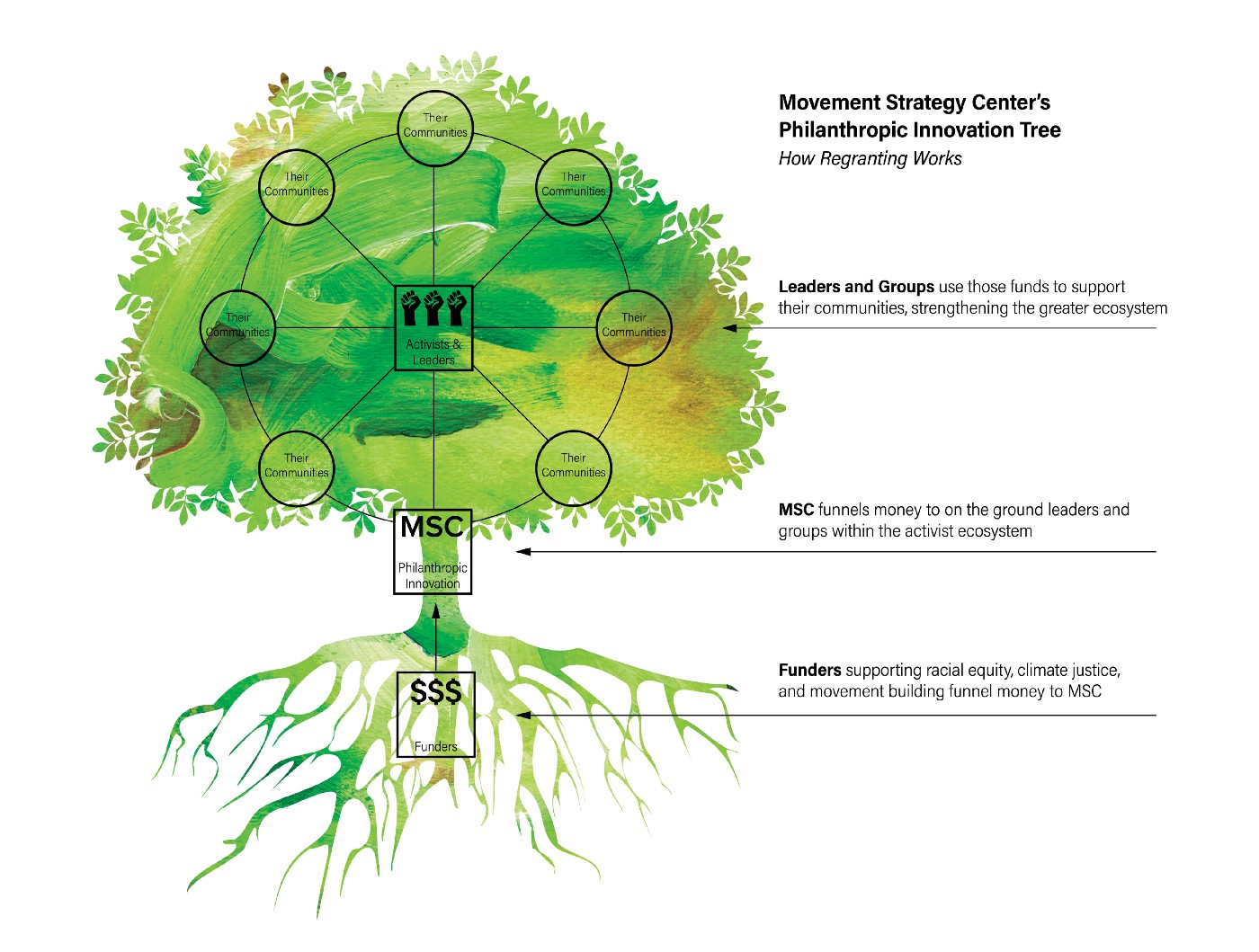Movement Strategy Center Reimagines Equitable Regranting Through Philanthropic Innovation

Regranting Today
In 2006, Warren Buffett announced he would donate 85 percent of his Berkshire Hathaway stock to charity. At the time, Buffett was the richest person in the United States, and his portfolio of stock in the holding company he founded was worth $44 billion. But Buffett did not pour over lists of individual nonprofits and NGOs before deciding exactly what to fund; nor was he content to exclusively pad the endowments of the various family foundations his wife and children founded and operated (that said, those organizations did receive a hefty $6 billion between them). Instead, Buffett decided to award the Bill & Melinda Gates Foundation the lion’s share.
Buffett’s gift of about $31 billion, over a number of years, solidified the Gates Foundation — which regrants funds to on-the-ground charities working to improve health and education in the poorest countries around the world — as the largest grant-making organization in America and one of the most influential in the world.
That, in a nutshell, is regranting. An individual or organization wants to make an impact but doesn’t necessarily have the infrastructure, access, or expertise to reach the communities that need it most. So, they funnel that cash into a grant-making organization. That organization, a presumed expert in the field, is better-positioned to determine where those funds can make the most impact and grants that money to the folks on the ground who can really make a difference.
Problems With Traditional Regranting
But, regranting has its flaws. There can be a lack of efficiency in the process — both in terms of the hoops organizations often have to jump through to apply for and secure funding and with regard to the time it can take for the money to get from a large foundation to an on the ground leader with immediate and shifting needs.
Beyond that, regranting is not immune to the often discriminatory practices that exist throughout philanthropy. A goal of philanthropy at large is to restore justice and mitigate inequities — but women- and BIPOC-led organizations are consistently underfunded. This is true for a number of reasons, be they outwardly racist or relating to a lack of connection and rapport between small, BIPOC-led nonprofits and the decision makers at foundations that often lack diversity in boardrooms and on senior leadership teams. In addition, so much funding is tied to unrealistic application and reporting requirements. Imposing these stipulations on small organizations and grassroots activists who lack the bandwidth, funding, and expertise to compete is just another form of discrimination.

How MSC is Changing Regranting
At Movement Strategy Center (MSC), we work to avoid the pitfalls and inherent discriminatory policies of traditional regranting with our “Philanthropic Innovation” program. The model encompasses more than regranting — much like the mold-breaking ways with which MSC incubates, accelerates, and provides infrastructure for fiscally sponsored projects, Philanthropic Innovation challenges the status quo. The proof is in the diverse cohort of organizations and individuals who have thrived within the program — the very ones that face the greatest difficulties accessing funding through traditional grant-makers. Which makes sense: our all-female senior leadership team and 100 percent BIPOC board lead a staff that is 85 percent BIPOC women. This diversity is a direct reflection of the values of the projects we provide infrastructure for — and flies in the face of traditional intermediaries.
What we are doing in the regranting space speaks to the emerging trend of “Participatory Grantmaking,” which shifts the power from grantmakers, boards, investors, and the wealthy to the movement leaders and communities on the ground. MSC believes it’s time to trust the front line groups doing the most difficult work in the communities most affected by injustice and inequity — and, crucially, we believe it’s time to provide support to these groups without imposing unrealistic metrics and deliverables. “These leaders know their communities. They understand the problems and issues firsthand and know best how to use funds to address them,” says Mohini Tadikonda, MSC’s Chief Advancement Officer.
Further, MSC seeks to support movement leaders and movement builders. Tadikonda believes movement building has been woefully underfunded across the philanthropic sector, despite being a foundational element to sparking and driving durable societal and systems change. “Movement building is still very much trapped in a short-term crisis response method of thinking. The reality is there are urgent issues and very little funding, and that prevents long-term thinking and planning.”
She continued, “we need to create spaces and resource opportunities for leaders to experiment and collaborate and also make mistakes, learn, and try again, which is difficult with limited resources and strict project specifications and requirements.” One such opportunity was the Next Generation Fund — anchored by the Ford Foundation — a response to a growing call from frontline organizers and leaders to learn restorative and transformative practices that support a rising generation of social justice leaders who can nurture sustainable approaches to organizing and community building.
MSC’s Successful Regranting Programs
These roots-up, on the ground individuals who are building movements and serving the communities they understand are best equipped to make change; and MSC has been supporting these individuals through innovative regranting since 2014.
“We need to create spaces and resource opportunities for leaders to experiment and collaborate and also make mistakes, learn, and try again, which is difficult with limited resources and strict project specifications and requirements.”
MSC was instrumental in the founding of the Building Equity & Alignment for Environmental Justice initiative and worked with the San Francisco Foundation on youth organizing projects. Other projects included the Assisting Partners for Places initiative, which focused on accessibility concerns and promoted grants for frontline groups rather than sustainability professionals, and advising the Kendeda Fund on areas of environmental justice funding that supported community-driven solutions in the field.
The Climate Resilience and Urban Opportunity initiative, a multi-year project developed with the Kresge Foundation, proved especially relevant in 2020 in the midst of the global pandemic. The project provided $5,290,575 in environmental funding to 126 underfunded frontline groups and individuals through grants and relief funds while hosting contracts for vital consultant work supporting multiple related initiatives. It also supported MSC’s more than 30 fiscally sponsored projects by managing hundreds of grants and contracts, while advising our philanthropic partners around budget creation and resource allocation strategies — decision-making that ensured increased transparency and accountability to the grassroots projects receiving the funds.
Initiatives like these are absolutely paradigm-shifting. They provide power-building, flexible resources to movement leaders working in emerging areas of focus in the social justice field who often face urgent financial needs. And, they push funding entities to shift the ways they conceive of their areas of interest in the context of intersectionality within complex societal issues. Through these processes, environmental funders have learned to broaden their definition of climate work to address the needs of urban groups pushing back on environmental discrimination in housing rights, public safety, and economic development. “We serve as problem solvers and thought partners for pooled funds, foundations, and corporations,” said Tadikonda. She added, “these projects have been successful because they put the communities most impacted by these environmental issues in charge of how to best address the challenges and benefit their communities.”
Our flexibility and willingness to think outside the box allows those receiving funds to “work around challenges and limitations rather than expecting them to work within systems that don’t support their circumstances.”
MSC’s Philanthropic Innovation work has included partnerships with tribal groups across the country, youth organizing groups with almost no fundraising experience, and brand new projects that need both seed funding and organizational infrastructure. One project, the California BIPOC Farmer and Land Steward Relief Fund, moved over $835,000 to 80 BIPOC farmers affected by the COVID-19 pandemic and the 2020 California wildfires. Many of these farmers are leading on implementing climate resilience practices but face incredible barriers accessing financial support for their enterprises — discrimination, language, and a lack of familiarity with granting processes.
Each project is tailored to the needs at hand without imposing artificial deadlines and processes. And, as an institution, MSC relies on simple, standardized platforms that enable the speedy movement of money to even the projects that lack traditional financial infrastructure and frequently face technology and language barriers. It surprises funders that projects may lack simple access to wifi or bank accounts — but we have learned to work with these roadblocks. Our flexibility and willingness to think outside the box allows those receiving funds to “work around challenges and limitations rather than expecting them to work within systems that don’t support their circumstances,” said Tadikonda.
Recently, MSC assisted with a regranting project that funded individual youth leaders who lacked a nonprofit or intermediary affiliation. Thus, the organization that normally handled this foundation’s regranting projects was unable to process the transactions. Tadikonda explained, “we were able to take this on by working within compliance to treat them as MSC subcontractors and pay them directly.” She continued, “we are problem solvers, and work around obstacles to ensure equitable access to resources for all.”
Carla Dartis, MSC’s Executive Director, added, “what really sets us apart, though, is our shared values and deep commitment to the work that our projects do. We put love at the center.”

